- Home
- /
- Resources
- /
- Latest News
Construction File: The Pitfalls of Incomplete Contract Documents
In providing a price, contractors expect that the contract documents are complete and reflect the project requirements, and that any changes, errors or omissions from the documents will lead to a change order with commensurate adjustment to both the contract price and duration. As the bidding is done in a competitive environment, contractors and their subcontractors are reluctant to add allowances to their tendered price, fearing that they will not be successful as low bidder. While the design may have taken several months to complete, the contractor is often unfairly expected to verify the consultant’s drawings and specifications for deficiencies or completeness during a much shorter bidding period. To remain competitive, a contractor should be able to rely entirely on the contract documents, and that their price will reflect the scope of work outlined in the documents alone, even if the contract is loaded with onerous clauses.
Different researchers have conducted studies to determine the common causes of significant claims on contracts and the results seem to be consistent. On average, claims amounted to 30% of the construction value. Four of the major causes for claims were:
- Inadequate site and/or subsurface investigation prior to starting the design
- Starting design efforts too late and/or unduly limiting the cost of engineering and design
- Calling for bids with an incomplete set of drawings
- Endeavouring to complete the design through shop drawing review
The common feature of all these projects was hurriedly and incompletely prepared bid documents, giving rise to design changes, extra work, and quantity fluctuation during the project. Many owners may argue that such a high premium can be justified as long as the facility is available on the scheduled date. Unfortunately, experience does not support such an argument. The analysis of the reports revealed that nearly all of them suffered significant delays, notwithstanding any attempted acceleration. The average delay was 5.69 months, representing nearly a 50% overrun in the average planned duration. Had more time been spent in investigating, planning and designing these projects than they actually did, they would have saved at least 20% of the actual cost even had they paid approximately 50% more to their designers. It is safe to state that the ultimate cost of the project would be significantly lower if owners allowed more time to complete their design.
Best Practices for Complete Contract Documents:
- Owners need to recognize there is an implied warranty that the drawings and specifications that they provide to the contractors as part of a contract are accurate, complete and buildable and that the contractor is not responsible for the consequences of defects in the plans and specifications.
- The owner should not skimp on the front 10% of the project costs (architectural and engineering) at the expense of the latter 90% of the project (construction). Owners should demand that consultants provide 100% complete contract documents at the time a contract is tendered. If necessary, cash allowances should be well defined.
- Most contracts require the consultant to perform the first adjudication of an issue, but when the claim results from design errors and omissions in the contract documents, the consultant may be in a conflict of interest position. The result is a possible dispute between the contractor and the owner with possible litigation costs. A better approach may be for the owner to use a third party neutral to provide an independent opinion on issues that arise during construction.
- The use of onerous clauses to prevent a contractor from recovering costs due to incomplete contract documents is not a principled practice and may not be considered as being fair by the courts. It may therefore be either unenforceable or interpreted to the benefit of the contractor. This should be taken into consideration when drafting a contract.
- When consultants have been asked why incomplete documents are issued for contracts, the usual response has been that the fees are not adequate to do a complete job. Designers should be cautious that commercialism does not replace professionalism.
These are some sound fundamentals for achieving the schedule and cost objectives of a project. The most critical of the requirements is having drawings, specifications and other parts of the contract documents as close to 100% complete as possible at the time of executing a contract. If 100% is not achievable for some reason, then the contract documents must make provision for fair and equitable adjustments to the time and price in the contract as changes are issued. Otherwise, the spectre of claims and potential litigation loom on the horizon to the peril of all parties involved in the contract.
Acknowledgement: This document was prepared from information provided in ‘The Revay Report, March 2010’ – to access the complete report, go to http://www.revay.com/index.php/publications/the-revay-report/.
.jpg)
BC Construction Association Contracts Fairley Strategies to Advise on Industry Advocacy Efforts Regarding Construction Procurement
.png)
BCCA Statement Regarding Compulsory Trades

Construction Workers Get Fast-Tracked for Covid Vaccine in Vancouver

BC Hydro and Site C Contractors Launch Canada's First Builders Code Work Site

Four British Columbians Recognized for Extraordinary Safety Leadership During Pandemic
.jpg)
Construction File - Building Back Smarter:
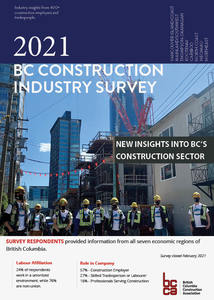
Latest Construction Industry Statistics Reveal Strength Despite Pandemic Challenges
.png)
BCCA Response to BC Budget 2021
.jpg)
BCCA Wins National Award for Second Consecutive Year

BC Restaurants to Benefit From Construction Month Celebrations This April
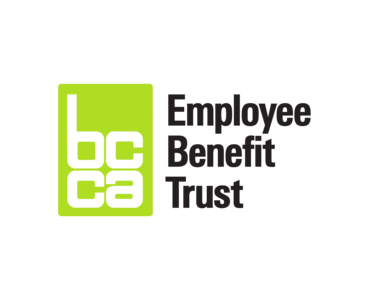
Christy Kerr of Kerr Controls Inc. To Chair BCCA Employee Benefit Trust Board of Trustees


Letters to the Vancouver Sun: Legislate Prompt Payments for the Construction Industry

Builders Code Champion Awards Celebrate Culture Change In BC’s Construction Industry

BC Construction Association Announces New Board Chair
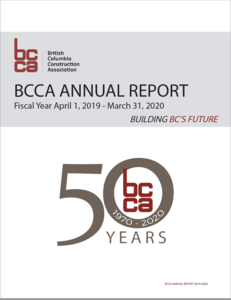
BCCA Releases it's 2020 Annual Report
BCCA to hold 2020 Annual General Meeting (AGM) Virtually
-01.png)
BC Construction Association Recognized for Achievements in Workforce Development with National Award

BC Construction Sector Awards to Recognize Workplace Diversity

Construction Sector United in Fight Against COVID-19
 (banner-large)-01.png)
Construction Culture Training Goes Virtual During Covid-19 Crisis
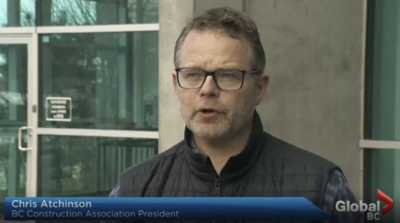
BCCA President, Chris Atchison Speaks to Global News About Safety Being the Most Urgent Priority on Construction Sites

BCCA Signs Agreement with eSolutionsGroup to Power BidCentral Platform
Business, Indigenous, and Community Leaders Call for a Return to Order
BCCA Responds to BC Government & Wet’suwet’en Leaders Agreement

BCCA Statement regarding COVID-19 coronavirus
BuildForce Canada 2020 Construction & Maintenance Looking Forward Report

Inaugural Builders Code Champion Awards Celebrate Construction Sector Leadership

BCCA Celebrates National Construction Day with New Worksite Behavior Training App
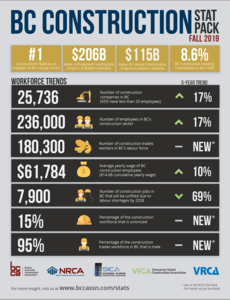
Fall 2019 Statistics Show Progress on Key Construction Sector Indicators
BCCA to hold 2019 Annual General Meeting in Prince George
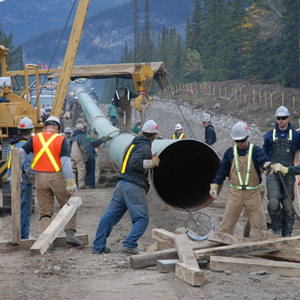
BCCA Welcomes Trans Mountain Announcement Resuming Work on Pipeline Expansion Project

Builders Code Ramps Up Services Across Northern Region
Court ruling allows construction industry stakeholder coalition to proceed through the B.C. Supreme Court with CBA challenge
Aligning the Construction and Technology Sectors
Multibillion Dollar BC Construction Sector Untapped by Tech
BCCA Commends Ruling in Favour of Trans Mountain Pipeline Project
BCCA Update on Private Members Bill for Prompt Payment
BCCA Response to Proposed Labour Code and Employment Standards Legislation

New Builders Code Training Program Gives Construction Leaders the Tools to Address Worksite Harassment, Hazing and Bullying

Six BC Employers Win Construction Leadership Awards
CBC Interview: Builders Code "Don' t Be A Tool" campaign
CHNL Interview: Construction Month 2019

BC Construction Month Launches with Latest Industry Statistics and Results of Province-Wide Industry Survey

Builders Code Expansion: First Advisor Now Available to Vancouver Island Construction Employers
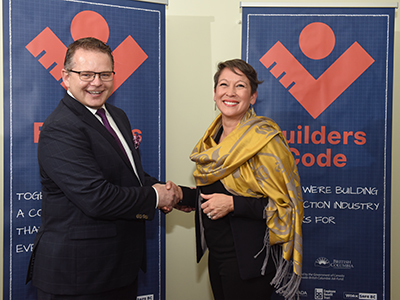
BC Construction Industry Introduces Worksite Conduct Standards to Improve Worker Retention
Risk Alerts Issued for Two Provincial Construction Projects
Contractor Alert - Westwood Court Prime Contractor Services
Contractor Alert - Hart Haven Group Home at Dagg Rd

Supporting BC's Skilled Workforce

British Columbia Construction Association Selected to Provide Pre-Arrival Services

A Dynamic Year In BC’s Construction Industry – Skilled Workforce Shortage Still The #1 Issue

Kinetic Construction Courts Young Hockey Players in Bid to Draw More Youth to Career Opportunities in the Trades

Angela McKerlich of CapriCMW Insurance Services Ltd. Elected BC Construction Association Board Chair

LNG CANADA Invests in BC and Canada: A Generational Milestone Achieved

BC 2018 Labour Market Outlook Released
.png)
BCCA Integrated Membership Update 2017
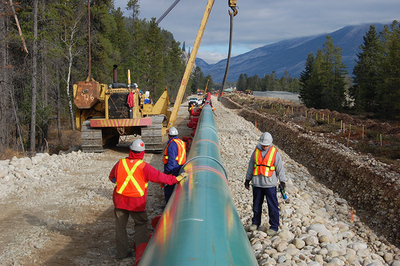
Response to Federal Court of Appeal's Trans Mountain Pipeline Decision
.jpg)
New BC Building and Plumbing Code 2018

Industry Policies that further validate BCCA’s challenge of the Community Benefits Agreement

Industry Voices - Industry Must Come Together
.png)
BCCA does not support Premier Horgan’s new Community Benefits Agreement
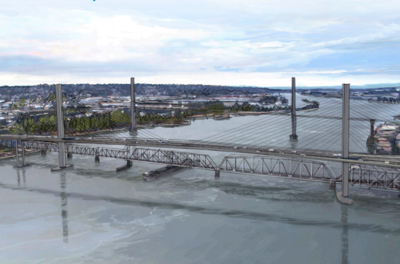
Pattullo Procurement Strategy Takes BC Construction a Bridge Too Far
.png)
B.C. needs Ministry of the Built Environment to manage construction issues

Response to the Province’s Community Benefits Agreement Announcement
.png)
Tackling the Late Payment Epidemic: What Will It Take?
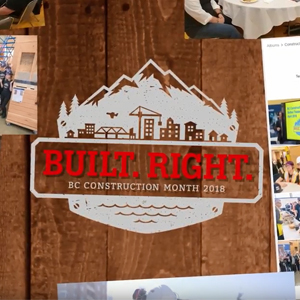
Construction Month in BC 2018 Recap Video #BuiltRight

Understanding Risk British Columbia (UR+ BC) Video #URBC

BCCA Response to Federal Purchase of Trans Mountain pipeline for $4.5 Billion

Dodge Momentum Index Moves Higher in April

BC Lions Announce "Salute the Trades" Game Night September 7

LNG Canada and TransCanada's Coastal GasLink Project Announce Expansion of "Connect" Program
.jpg)
.PNG)